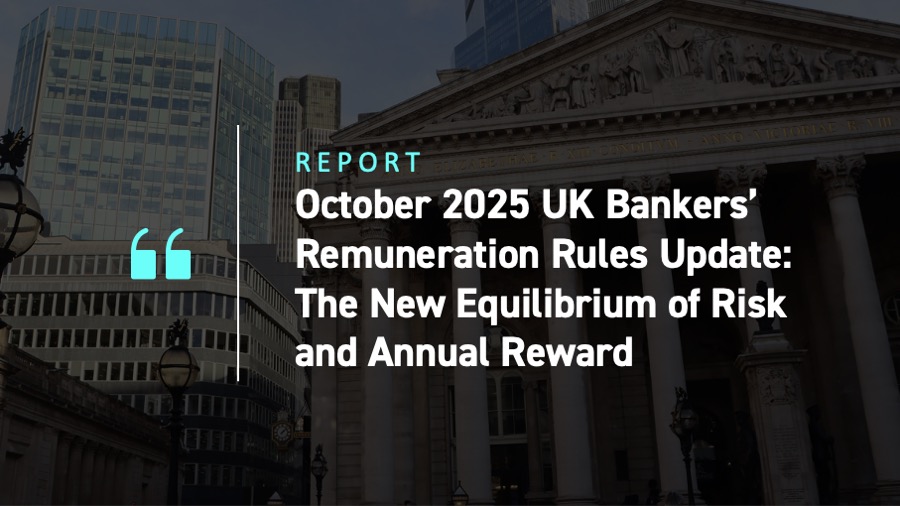Following a joint consultation (CP 16/24) launched in November 2024 by the UK’s Prudential Regulation Authority (PRA) and the Financial Conduct Authority (FCA), a fresh round of updates to the remuneration rules for senior bankers was published on 15 October 2025, as detailed in policy statement PS21/25. The key changes outlined in this update include:
- Reduced Deferral Period: The maximum bonus deferral period for senior bankers (Material Risk Takers, including Senior Manager Function holders) has been reduced from an effective eight years (seven years deferral plus a 6–12-month retention period) to a uniform four years from grant.
- Faster Vesting: Partial payment of bonuses for the most senior bankers will be allowed to commence from Year 1, rather than being deferred until Year 3 as under the previous rules.
- Flexible Instrument Mix: The rules introduce greater flexibility in the composition of deferred and upfront pay, allowing firms to defer more of the component comprised of shares and other instruments, encouraging “responsible risk-taking”.
- Targeted Deferral Thresholds: The restrictions on the proportion of bonuses that must be deferred will also be eased. Previously, 60% of the full bonus above a GBP 500,000 threshold would need to be deferred. Under the updated rules, the 60% deferral requirement only applies to bonus amounts above the GBP 660,000 threshold, with the first GBP 660,000 subject to a 40% deferral mandate.
The above changes, particularly the reduction to the deferral period, signals a regulatory pivot aimed at boosting the competitiveness of London’s financial sector, which echoes comments from Chancellor Rachel Reeves that the UK was an international outlier on deferral arrangements, following the introduction of additional remuneration structures in the aftermath of the 2008 financial crisis. The proposed reduction in bonus deferral period aligns the UK market with major non-EU financial centers, including the U.S. and Singapore, in an effort to promote talent attraction and retention. Coupled with the earlier removal of the EU-era bonus cap (for further details please see the ISS article: Recent and Proposed Changes to Regulation of Bankers’ Remuneration in the UK), this latest reform aims to promote a flexible and attractive remuneration environment, and represents ongoing efforts to improve the UK financial services sector’s competitiveness, which was one of the main themes of the Chancellor’s November 2024 speech at Mansion House.
Regulator’s comments / The Strategic Rationale: Recalibrating Risk Incentives
Compared to fixed pay, bonuses are inherently more sensitive to risk outcomes and can be more easily reduced or clawed back in the event of poor performance or misconduct.
By reducing the deferral period and increasing flexibility, the PRA and FCA aim to make variable pay (bonuses) a more attractive and flexible component of the total reward package, thereby theoretically making it easier for firms to adjust total remuneration downwards should risk outcomes deteriorate. At the same time, this greater flexibility is explicitly conditioned on strengthening the link between pay and responsible risk-taking. The new rules strongly encourage firms to tie bonus adjustments more closely to both successful outcomes and risk-management failures, thereby introducing greater alignment with the Senior Managers Regime (SMR).
The October 2025 remuneration rule changes came at the same time as a 70% cut to the FCA remuneration Handbook rules – companies now only need to largely refer to the PRA rules around remuneration, and all changes are applicable to the FY2025/26 bonus cycle. This is explained by the regulators as a bid to remove “unnecessary duplication” and reduce “unneeded complexity” for boosting competitiveness of the UK. As a result, firms are anticipated to have lower compliance costs.
Critics have long expressed concerns that the removal of bonus caps would encourage excessive risk-taking, which ultimately contributed to the 2008 financial crisis. However, regulators responded that mitigations have been put in place, including bonus deferrals and malus and clawback provisions. With the bonus deferral period shortened under this new update, the PRA highlights that the deferral mechanism will continue to provide sufficient time for problem spotting and to act on any necessary corrective action. The PRA also expects the changes to further deter any material increase to the fixed pay proportions, aiming to reverse this legacy trend caused by earlier deferral rules. It is noted that following the October 2023 rules update where the fixed-to-variable pay ratio cap was removed, revised remuneration policy proposals from major UK listed banks during the 2025 proxy season already represent a trend of reverting to significantly higher proportion of variable pay for board executives. The regulator further states that higher variable pay proportion drives down fixed costs (fixed pay elements such as salary and fixed pay allowance) and can in turn enable a bank to achieve better cost management and loss absorption during a downturn.
While competitiveness (alongside the benefit from immediate implementation) is highlighted as the core driving force for the regulatory changes, the updates are also a strategy to reverse a structural anomaly created by the very rules they are now reforming, which had led banks to disproportionately increase fixed pay at the expense of performance-linked variable incentives.
Recap of the bonus cap removal and its impact on the 2025 proxy season
Following the October 2023 removal of the EU regulation-based bonus cap introduced after the financial crisis, which had limited variable pay to a 2:1 ratio compared to fixed pay, many banks have, in response, reintroduced variable, at-risk pay structures during the 2025 UK Proxy Season. All proposed remuneration policies received strong backing from shareholders, with enhanced competitiveness in attracting global talent cited as a primary motivation expressed across firms. A reallocation of pay emphasis whereby fixed components were reduced while variable incentives increased, was evident at the 2025 AGMs of HSBC, Barclays, and Standard Chartered, which took place between April and May 2025.
HSBC increased its total variable incentive potential by 365% of base salary, where the LTIP component rose from 320% to 600%. This was largely balanced by the removal of the Fixed Pay Allowance, which had previously formed a substantial part of executive remuneration – at 150% of base salary for former CEO Noel Quinn.
Barclays materially uplifted its variable incentive potential – from 233% to 800% of base salary. Similar to HSBC, this increase was offset by substantial reductions in fixed pay, which was nearly halved for both Executive Directors as the share portion was removed.
Standard Chartered materially increased the cash component of the CEO’s base salary by 19% to GBP 1,500,000 and removed the share-based portion of Executive Director salaries. The CEO’s total variable incentives increased from 220% to 760% of base salary, compensating for the now absent salary shares.
Among the banks, NatWest‘s remuneration proposals received the highest shareholder approval at 98%. It transitioned from a Restricted Share Plan (RSP) to a performance-linked Long-Term Incentive Plan (LTIP), while maintaining the 2:1 variable-to-fixed pay ratio. Consequently, its overall pay potential remains in a position amongst the lowest against domestic peers of a similar size.
Lloyds was the only major UK bank that did not present a new remuneration policy during the 2025 proxy season. A revised policy is anticipated at its 2026 Annual General Meeting, and may incorporate changes to the bonus deferral periods, in response to the updates discussed above.
Implications for Governance and the Way Forward
For banks, there may be an appetite to update their remuneration policies to reflect the new flexibilities and accountabilities granted by the revised rules. This also offers an opportunity to make pay packages more in line with banks’ risk management frameworks for the upcoming 2026 performance year. While the minimum deferral period is set by the regulators, firms are expected to tailor their respective deferral policies to ensure robustness in accordance with their own risk profiles.
For institutional investors, the focus will likely shift:
- From Length to Quality: Shareholder scrutiny may move away from the length of the deferral period and concentrate on the robustness of the performance conditions and the effectiveness of the Malus and Clawback provisions tied to the four-year vesting cycle.
- SMR Alignment: Investors may expect to see clear demonstration by the Remuneration Committees on how the variable pay outcomes of senior managers are assessed against the PRA’s supervisory priorities and how they are adjusted to reflect risk-management failures.
- Total Reward: While pay flexibility increases, the overall quantum of pay and the ratio between fixed and variable elements will continue to be a key point of governance debate, ensuring that changes induced from the motive of improved competitiveness do not lead to excessive reward detached from sustainable long-term performance.
The updates mark another streamlining effort by the PRA and FCA of the complex, post-crisis regulatory regime. The new rules offer a more simplified pathway for UK banks to compete globally for talent while seeking to retain an expectation of individual accountability for risk. For Remuneration Committees and governance professionals, the focus is now squarely on the quality of risk assessment, not merely the quantity of time elapsed.
They also mark a further step in recalibrating UK bankers’ remuneration against that of their international peers. By coupling greater flexibility in pay with increased accountability, the regulators have sought to create a more competitive UK financial sector. The onus is now on the banking industry to operationalise these changes, ensuring that the new flexibility serves to drive sustainable growth and responsible risk-taking.
ISS will continue to monitor developments in UK market practice in all relevant areas, and remuneration arrangements will continue to be assessed on a case-by-case basis, considering the merits of the explanations provided.
By: Martin Lin




